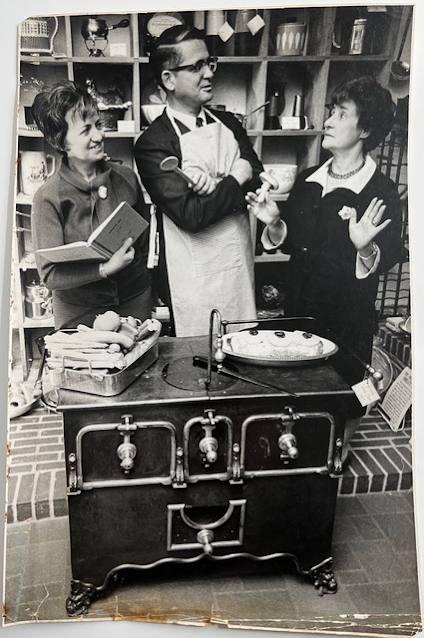It all started with a photo.
Specifically, THIS photo:
 |
| L-R: Roma Lubinski, ?, and ? |
It all started with a photo.
Specifically, THIS photo:
 |
| L-R: Roma Lubinski, ?, and ? |
So, yesterday, I wrote about how my grandparents went out partying on New Year's Eve. My grandfather recorded the exact date (December 31, 1930) and exact time (10:30 pm) and that they were going to the Chantilly after the photo was taken.
Now, I haven't scanned all the photos in the album yet (I'm about 1/3 of the way through), but this is the only example so far of my grandfather's writing on the back of a photo. Most are blank. One has what is probably my great-grandmother's handwriting on it. The others have what I suspect is my grandmother's handwriting.
The romantic in me, sees the significance of my grandfather going to the trouble to recording the exact date and time and what they are going to do next. He didn't do that for any other photo, so it seems important somehow, like maybe ... he asked my grandmother to marry him when they were at the Chantilly, or something like that?
Or maybe he just recorded it because they were young (18 and 20) and it was a fun night for them.
Anyway, through the help of some friends, I've found out that the Chantilly was a jazz club in the Hotel Terminus on Pelikaanstraat in Antwerp. Friends found genealogy records of musicians who actually worked there in the 1930s. And they found this old postcard that shows the hotel, and in the lower left, you can see the Chantilly (click to enlarge):
I did a few more searches and found the following page (it's written in Dutch/Flemish), with this image:
Hotel Terminus, Pelikaanstraat, c.1910 | 2020
Another fine piece of work done by Antwerp, Wish You Were Here. It's great how the old photos are incorporated into the current street scene!In the photo you see the former Grand Hotel Terminus in the Pelikaanstraat. This beautiful building was built in 1902 by Joseph Hertogs. The hotel was graced by luxurious interiors, dazzling banquet halls and majestic entrance halls. The clientele consisted of the then Antwerp bourgeoisie and wealthy tourists. Unfortunately, in the second half of the 20th century, this building too had to be demolished to make way for office buildings.The Pelikaanstraat used to be a really prosperous street full of stately mansions. You also found a cigar factory and the presence of catering was evident here.
Alas, the building is gone. But, there you have it: the jazz club my grandparents went out dancing on New Year's Eve in 1930.
The battered photo below was on the first page of my grandparents' photo album. In December of 1930, my Grandpa Arthur was just 20 years old, and my Grandma Roma was 18.
My grandfather was born in Belgium, but grew up in Poland. My grandmother was born and raised in Poland, and they were childhood sweethearts. Grandpa's family went back to Belgium in 1927 so he could finish high school and attend University. Eventually, in 1931, my grandmother moved to Belgium where she too attended the university.
The front of the photo tells me a few interesting things: My grandmother visited my grandfather in Belgium before she started at the University as a college student in the fall of 1931 (keep in mind that traveling from Łódź to Antwerp took two days by train in those days). They look like they are dressed for a party, and my grandfather had a full head of hair (he had significant hair loss by 30 and was bald by the time I knew him).
Oh, and those look like martini glasses to me.
Anyway, this event was important enough for my grandparents to record the city, and the exact date and time, and that it was before they later went to the Chantilly, an event which was itself meaningful enough to memorialize on the back. And when my grandparents escaped to France, they left pretty much everything behind, but this photo (and a few others) went with them.
I can't know the importance of the Chantilly, but I love the mystery, the idea of it, and that my grandparents were once young party-goers.